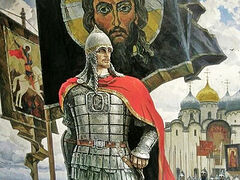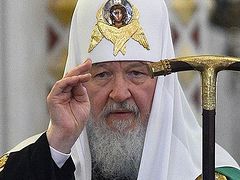At the end of the year it’s traditional to tally up conclusions. This is a certain obligatory, and in fact necessary procedure. Without making sense of the passing year, without taking account of what we achieved and didn’t achieve, what goals were reached and what mistakes were made, we can hardly count on living through the coming year thoughtfully and responsibly—or to put it another way, in vain.
So now 2020 is ending… And I cannot speak for everyone, but I can say for myself quite definitely that it is harder than ever to reach any conclusions. Why? Probably the main reason is that there has been too much confusion this year, too much of what we’re not used to, and it’s all become no small trial.
Of course, the main event of 2020 was the pandemic. It was something that practically none of us expected; and with very few exceptions, no one was prepared for it. And for us Orthodox Christians it was very difficult to imagine that something like this would happen, something that would not only have such an effect on the entire order of religious life but also on our minds and hearts. Probably every Christian will one way or another ponder deeply (or at least they should ponder deeply) how the situation of the Church in this world is inconstant, that periods of relative prosperity are changed by periods of uprisings against the Church—obvious or hidden persecutions against it. But could anyone have supposed that the persecutor would be a virus coming out of China? That churches would be closed, and that when they opened people would be allowed in according to a reservations list? That there would be markers on the floors of the churches to help people observe social distancing—there, in a place where there should be no distance between us, where we are truly called to become one whole. That furious discussions would ensue about whether a Christian has the right to receive Communion or whether he should abstain from Communion of the Body and Blood of our Lord Jesus Christ in order to avoid infection or put other people at risk. That we would be wiping the Communion spoons with napkins soaked in alcohol, and wiping people’s lips with burnable napkins… And much, much more in that vein…
It is hard for me to assess unequivocally what we have lived through over this period of time, and what we are still going through now. On the one hand, it is quite clear that the pandemic has dealt the world a serious blow, and caused great loss. The blow was not only against the economic or political systems of many different nations, but as it applies to our own situation, it was also against Church life; and we cannot but notice the losses caused by the coronavirus, and the limitations on the Church that it brought.
But there is another side to this. It seems to me that the pandemic forces us (or should force us) to rethink very much. We have seen clearly how the world can suddenly become completely different, unhabitual, inconvenient. We have seen how in a very short time all the problem areas were revealed in our health systems, the economy, and legislation. All the shortcomings and omissions were brought to the fore—and the first people to suffer are those who are not well off. Thanks to this it has become much easier to understand what chaos the world can easily fall into if it should be faced with more global trials, and if there be not just one catastrophe but a whole chain of them, as often happens. We have the fortunate opportunity to ponder this: What is specifically demanded of us so that we would not find ourselves unprepared for such tragedy, so that we would not simply turn into disparate particles of that chaos?
I will talk about simple, even banal things, but things that are very often consigned to oblivion. Each of us must try to bring our own affairs into order to greatest possible extent. You know, we are, after all, to a significant degree disposed to put off everything until “later”. It seems that we still have time to pay our debts, finish building our houses, put off our studies for another year, and take our physical health in hand. Undoubtedly someone will say that all of this is not the most important, that there are much more important things. I agree. But you can’t argue with the fact that disorder in external affairs can become a heavy burden in moments of all-around crises, which is something that all of us in one way or another experienced during our first lockdown.
And this is not all. We must unfailingly make our own determination as to what is truly necessary, and what we can do without. The tight circumstances that come with a crisis period are most often not terrifying in and of themselves. They become a tragedy when, having found ourselves in them, we are incapable of coming to terms with the fact that our demands and requirements can no longer be satisfied. Therefore it is very important to scrutinize these demands and requirements themselves and come to the obvious (primarily for the religion person) conclusion: The simpler they are, the easier it is for us to survive. And the reverse is also true.
But this is only half of the matter. It is most important of all to entrust ourselves and all our circumstances to God. This, again, is an incontrovertible truth. But under the current conditions it becomes very relevant, and while remaining true, it is also of the utmost necessity.
The coronavirus has forced many to take a hard look at their own religious life. A prosperous, lively parish is a parish where educational and social activities are well developed, where people are united by their common life together, where their unity is not limited to ordinary greetings at services, where good works and mutual aid are not platitudes but a daily reality.
Sunday school, catechism classes for adults, learning how to sing in the choir, clubs for the elderly, volunteer groups, Sunday talks with the priest, and film clubs are all things that form and cement the life of the parish. And how hard it was to realize that all of this had to be put on hold for an indefinite period of time until circumstances change. And I perfectly understand that this has become a problem not only for me and our parishioners, but for all the clergy and parishioners of the Russian Orthodox Church, as well as for all other Local Churches.
We have seen less of each other, spent less time together, and have had to cease all our “educational programs”. It would have been hard to do otherwise in light of the climbing vector of infection. Some of us have literally disappeared from the church. Some have departed during these months forever, and our communication with them will now only be through our prayers for their repose.
And here we have also had to seek an answer to the question: How shall we live a full life under these changed circumstances, how shall we not lose our composure, not ruin everything that we have built up over many long years? Our parish like many others have started live-streaming our services on YouTube, and organizing live question and answer sessions on Instagram. And of course, we have been praying for each other and for the sick. But it was impossible for us not to feel how inadequate this is, how that feeling of community and warmth we had before was leaving our lives. It was very painful to see how much of what we had built so laboriously was falling apart. Nevertheless, the answer to the question of what we should do and how we can hold on to our unity came sufficiently quickly. Because we have tried to constantly maintain contact with each other and with those who found themselves torn away from church life, we have continually received news about those who had fallen on particularly hard times. Thus did our programs for material help to needy parishioners develop. We had no resources for this other than our willingness to help each other—our church funds had decreased to the bottom limit—but nevertheless we were able to achieve our initiative.
Then people came—all different people, even people we didn’t know before—who wished to participate in the work we had begun. And if at first we supported twenty-five people, little-by-little the circle of those in our care began to encompass poor families who live in the vicinity. Now there are already 150–200 people whom we are able to help on a regular basis. They were joined by the doctors of one of Saratov’s covid hospitals.
Then this food support was joined by other items for children and adults, means of transport, and everything needed by people who have no one to help them.
And when drugs needed to treat covid started disappearing from the pharmacies, we organized a search for them, bought them in Moscow and other cities where they could be found, and formed a small foundation that gave us the opportunity to provide people who were sick with medicines that they couldn’t have otherwise found in time.
 The “Good Folks” logo. People were needed to pack and deliver groceries, search for needed things, for those medicines, to fix something or other… Thus in a rather short time our small parish group of volunteers grew substantially, taking in those people who were not our parishioners before. And this how our “Good Folks” society was born.
The “Good Folks” logo. People were needed to pack and deliver groceries, search for needed things, for those medicines, to fix something or other… Thus in a rather short time our small parish group of volunteers grew substantially, taking in those people who were not our parishioners before. And this how our “Good Folks” society was born.
I quite understand that we have not yet come out of this crisis. And it’s hard to say which prognoses will prove to be true, how long the pandemic will go on, and what will happen after it. However, for me it is absolutely clear that this period did not only deprive me of something important and habitual—it also gave me something that I didn’t have before: an experiential understanding of how fragile the world that we live in is. How suddenly life in the Church can change. How changes can happen in our personal circumstances. And how important it is to be prepared for anything. And that this preparedness can, in the final analysis, only be conditioned upon our complete and total trust in God.
Moreover a small but very important and precious miracle for me is the appearance of “Good Folks”—a society that we needed a long time ago, for which we had no time, strength, or money, and which arose right when everything enumerated above turned out to be far too little. It arose both despite the crisis and thanks to it. This is a lesson for me. It is a clear testimony to me personally that hard times can give you much more than the most prosperous of times. And I am sure that such lessons and testimonies of this passing year have enriched many. It means that no matter how hard it was, we haven’t lived through it in vain. I am thankful to God for it, and this gratitude helps me to greet the new year without anxiety or despondency.
This is my personal assessment of the passing year—the clarity to which I have managed to arrive.





